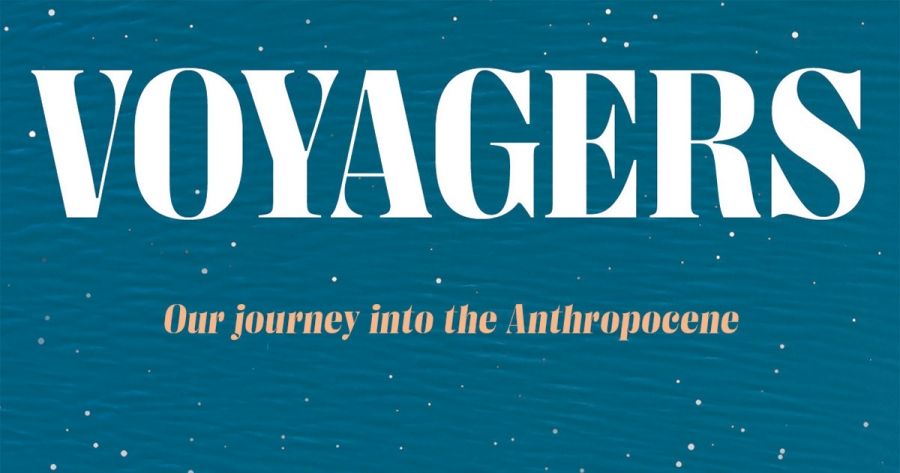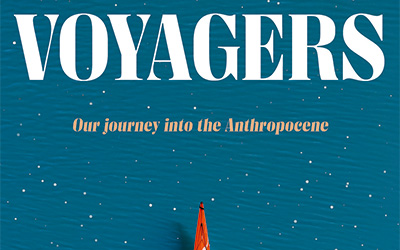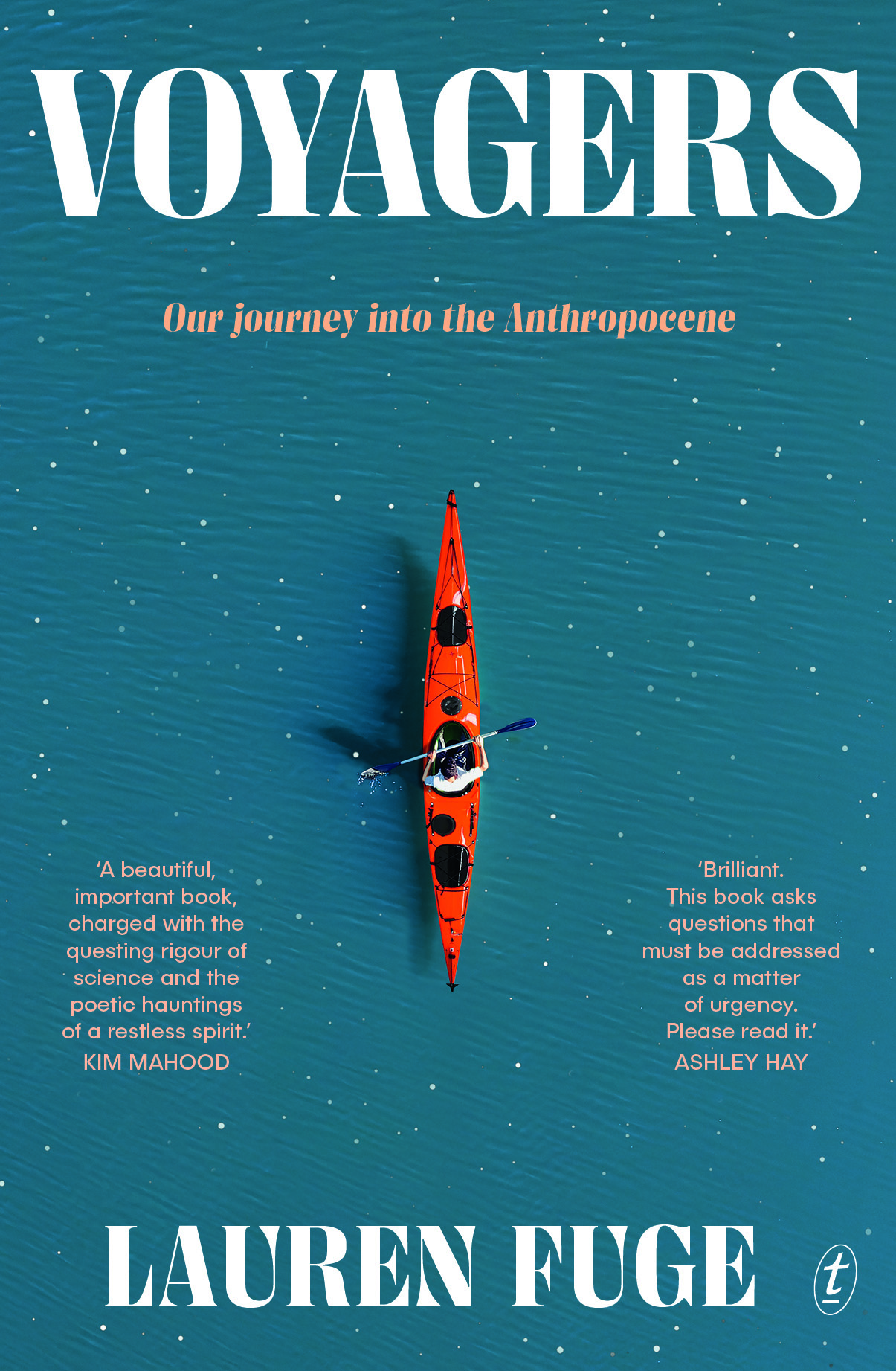
- Free Article: No
- Review Article: Yes
- Article Title: Now, voyager
- Article Subtitle: New frontiers in nature writing
- Online Only: No
- Custom Highlight Text:
It is rare to encounter spacecraft in nature writing. Indeed, most definitions of nature confine it to Earth’s boundaries. A few pages into Lauren Fuge’s book, we are treated to the image of two Voyager space probes, more than sixteen billion kilometres from the Earth and ‘driven by the most ecstatic imaginings of human exploration’. This is a mark of Fuge’s ambition. She is as comfortable crossing the frontiers of interstellar space as she is describing oystercatchers pattering feather-light in the sand.
- Featured Image (400px * 250px):

- Alt Tag (Featured Image): Dave Witty reviews ‘Voyagers: Our journey into the Anthropocene’ by Lauren Fuge
- Book 1 Title: Voyagers
- Book 1 Subtitle: Our journey into the Anthropocene
- Book 1 Biblio: Text Publishing, $36.99 pb, 293 pp
- Book 1 Cover Small (400 x 600):

- Book 1 Cover (800 x 1200):

- Book 1 Readings Link: https://www.readings.com.au/product/9781922790774/voyagers--lauren-fuge--2024--9781922790774#rac:jokjjzr6ly9m
I first read the essay in The Best Australian Science Writing 2023. It traces Fuge’s ascent through the world’s largest blue gum from the moment she harnesses up to her suspension seventy metres in the air. At times, the writing is as vertiginous and bracing as Richard Powers’ The Overstory, but what makes the essay particularly noteworthy are the allusions to space travel. How, we are left wondering, did humans journey to the moon before exploring the upper reaches of the tree canopy?
Fuge is particularly intrigued by the Overview Effect, the idea that we must transcend traditional perspectives to realise Earth’s beauty. ‘From this God’s eye-view,’ remarked astronaut Piers Sellers, as he looked back on our planet, ‘I saw how fragile and infinitely precious the Earth is.’ There is a section in Voyagers when Fuge, after viewing the Pleistocene footprints of Red Gorge and the Proterozoic rocks of the Flinders Ranges, has a similar jolt of transcendence: ‘A sense of half-understanding touched the edge of my consciousness, as if I were feeling in the dark the outline of a truth that would vanish if I switched on the light.’
The voyagers in Fuge’s work are multifarious: whales, New Oceanians, migratory birds, Pacific sailors, Enlightenment explorers, Vikings, and Beringians. Lauren herself is a voyager: restless, inquisitive, always wondering what could be gained from crossing the horizon and disappearing into the unknown. As a child, she was drawing maps of pirate-infested seas and building toy sailboats in her father’s shed. By early adulthood, she was travelling around the world.
How, you might be asking, can such a restless spirit sit down for months at a time to write a book? It recalls for me the dissonance felt by the astronauts in Samantha Harvey’s Orbital, one of the shortlisted novels for this year’s Booker Prize and an agreeable companion piece to Fuge’s work. For Harvey’s astronauts, their ambition and desire to explore culminates, ironically, in their confinement on the international space station, barely able to move and repeating the same experiments and rituals every day.
It is this contradiction that is central to human progress. Our impatience for novelty is tempered by the care with which we process ideas and information. This is why we have thrived as a species. We can learn swaths of data as we adapt quickly to the new territories we have breached. But we are also far more refined than simple computers with arms and legs. We are creatures with a shared quest for meaning and beauty, and we tend to forget this when imagining the future.
Play the golden phonograph on the Voyager space probes (the records which, should they ever be found, intend to convey humanity to a passing alien) and you will realise the significance we place, as a species, on images and sounds that emotionally move us: the haunting chants of the Navajo; the passage of birds silhouetted against a sunset; the sound of whale song; and the cadences of Beethoven’s Fifth Symphony. The future, for all its turmoil and transformation, will not be shorn of these exquisite moments. Societal change will be fraught and distressing, but, on occasion, it may also be sublime.
This seems to be Fuge’s epiphany. ‘Stepping into the future is an act of exploration,’ she writes at one point, inadvertently creating a slogan that could be emblazoned across Voyagers merchandise. The journey she envisages will not be geographical or astronomical, but an exploration of ideas and new behaviours. It will develop from the ground up, arising socially and collectively. In the face of adversity, these ideas can, as humanity has proven across the ages, evolve with an exhilarating force.
It is an urgent message that builds as the narrative progresses, and I could feel my pace of reading quicken as Fuge describes her awakening at Lathamus Keep. There are tender scenes as well, such as her description of breaking up with her partner of many years, the latter admitting she could no longer endure the pressures of Lauren’s activism.
That incident may well be symbolic of the sacrifices we will all be forced to make, every one of us, as the Earth’s reckoning plays out over the coming decades. A book like this could be sombre or dispiriting, yet it is testimony to Lauren Fuge’s faith in experiential wonder and ideas that she creates such a compelling read. ‘Look up voyager,’ she writes at the end. ‘See the curve of the horizon? The future is there, and it’s ready to be made.’


Comments powered by CComment